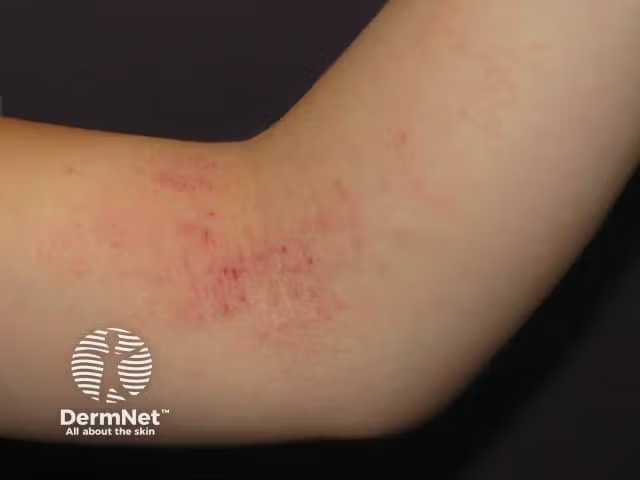- Case-Based Roundtable
- General Dermatology
- Eczema
- Chronic Hand Eczema
- Alopecia
- Aesthetics
- Vitiligo
- COVID-19
- Actinic Keratosis
- Precision Medicine and Biologics
- Rare Disease
- Wound Care
- Rosacea
- Psoriasis
- Psoriatic Arthritis
- Atopic Dermatitis
- Melasma
- NP and PA
- Skin Cancer
- Hidradenitis Suppurativa
- Drug Watch
- Pigmentary Disorders
- Acne
- Pediatric Dermatology
- Practice Management
- Prurigo Nodularis
- Buy-and-Bill
News
Article
RECAP Measurement Validated for Atopic Dermatitis
Author(s):
Results of a recent study show RECAP's impact on adult Asian patients with AD.
Image Credit: © aamulya - stock.adobe.com

A recent investigation into recap of atopic eczema (RECAP) as an effective measurement instrument of disease control in Singapore showed strong results, with correlations between symptoms and quality of life (QoL).
The analysis showed strong, significant correlations of RECAP with Patient-Oriented Eczema Measure (POEM) and Dermatology Life Quality Index (DLQI).
Correlation with SCORing Atopic Dermatitis (SCORAD) showed to be moderate.
“Having a standardized, valid instrument for global control of eczema in clinical trials is important, as this will allow comparison between various treatment agents in different clinical trials, with outcome measures being clinically important and meaningful to patients,” the researchers behind the investigation wrote.1
Background
Patients with atopic dermatitis (AD) face a burden closely correlated with disease severity. Physician-reported measures such as the Eczema Area and Severity Index (EASI) and SCORAD, as well as patient-reported outcomes such as POEM and QoL measures such as DLQI all have strengths and weaknesses as measurement instruments. To address a primary weakness of these measurement tools, the 7-item self-reported questionnaire was developed to calculate the long-term control of eczema in all trials.
While the Harmonizing Outcome Measures in Eczema initiative has recommended RECAP, the tool has not been validated in a real-world clinical population in Asia until now. Since being validated in English, other language versions of RECAP were also developed including German, Dutch and Spanish. Researchers behind the Spanish version of the tool said users found it to be comprehensible and easy to answer, and reported finding similar correlations as Yew et al.2
Study
Researchers in this study aimed to investigate the acceptability, construct validity, and reliability of RECAP as a measure of eczema control with Asian adult patients, as well as evaluate feedback from a 13-person subset of the participants.
Patients with AD who were treated at the National Skin Centre, a tertiary dermatology center in Singapore, from July 2019 to January 2020 were included in the investigation. In total, 260 patients between the ages of 15 and 87 were recruited (mean age = 25.8), with minimal floor and ceiling effects for RECAP scores.
Data was collected at the initial visit for all participants(n = 260), and at a follow-up visit for 43 patients between 2 and 3 months after the first.
While nearly all patients completed the patient-reported outcome measures such as POEM and DLQI, only some had their SCORAD and EASI completed.
The correlation analysis between POEM and RECAP was assessed and reported as Spearman correlation coefficients, with r≤0.3 as poor, 0.3<r<0.7 as moderate, and r≥0.7 as strong.
Yew et al hypothesized that higher mean RECAP scores correlated with worsening disease severity bandings, suggesting that RECAP can differentiate AD patients with differing disease severities.
Validity
RECAP showed moderate to strong correlations with POEM, DLQI, and SCORAD (r(299) = 0.84, p < 0.001; r(297) = 0.81, p < 0.001, and r(103) =0.60, p < 0.001 respectively). After adjusting for age, gender, and ethnicity, the correlation remained strong.
“Convergent validity was clearly demonstrated for RECAP when compared against POEM and DLQI,” Yew et al said.
RECAP and SCORAD had moderate correlation (r = 0.60), and the correlation with EASI was moderate and not significant (r(17)=0.42, p = 0.096). This was still, however, better than initially hypothesized.
These findings supported the hypothesis that there was discriminative validity, proving consistent with other validation studies in Europe.
Feedback and Acceptability
Overall feedback from the study’s participants was good, claiming that RECAP was easy to complete, comprehensive, relevant, and recognized the physical and psychological challenges eczema patients face.
However, patients suggested that RECAP should address the efficacy of current treatments, location of itch, and a wider scale.
While the researchers in this study agreed that efficacy could be explored as an element, they said that the location of itch was not necessary as the primary aim of RECAP was to capture the overall experience of eczema control. Researchers also noted that a wider scale would make comparisons similar to this study less desirable.
Conclusions
To the knowledge of the researchers, this is the first study testing the validity of RECAP among adult Asian patients in a clinical setting.
Although this is an important step in validating the measurement tool internationally, the researchers noted other studies could explore wider audiences such as younger patients or various Asian populations of different cultures and native languages.
References
- Yew YW, Phuan CZY, Zhao X, Howells L, Apfelbacher CJ. Validation of the recap of atopic eczema (RECAP) measurement instrument for eczema control in adult patients in an asian clinical setting. Acta Derm Venereol. 2024;104:adv32323. Published 2024 May 13. doi:10.2340/actadv.v104.32323
- Onteniente-Gomis MM, Ortiz-Romero PL, Tous Romero F, Salamanca Castro AB, Ortiz de Frutos FJ. Spanish version of the RECAP questionnaire to assess control of atopic eczema: translation, cultural adaptation, validation, and correlations with other patient-reported outcome measures. Actas Dermosifiliogr. 2023;114(6):488-493. doi:10.1016/j.ad.2023.02.018






